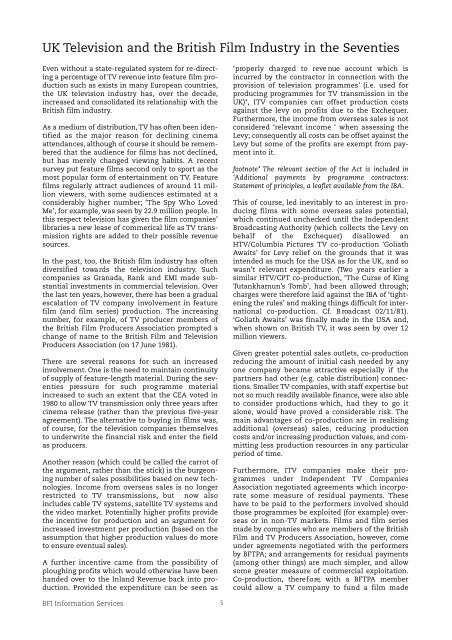Download (1.77 MB - PDF) - British Film Institute
Download (1.77 MB - PDF) - British Film Institute
Download (1.77 MB - PDF) - British Film Institute
You also want an ePaper? Increase the reach of your titles
YUMPU automatically turns print PDFs into web optimized ePapers that Google loves.
UK Television and the <strong>British</strong> <strong>Film</strong> Industry in the Seventies<br />
Even without a state-regulated system for re-directing<br />
a percentage of TV revenue into feature film production<br />
such as exists in many European countries,<br />
the UK television industry has, over the decade,<br />
increased and consolidated its relationship with the<br />
<strong>British</strong> film industry.<br />
As a medium of distribution, TV has often been identified<br />
as the major reason for declining cinema<br />
attendances, although of course it should be remembered<br />
that the audience for films has not declined,<br />
but has merely changed viewing habits. A recent<br />
survey put feature films second only to sport as the<br />
most popular form of entertainment on TV. Feature<br />
films regularly attract audiences of around 11 million<br />
viewers, with some audiences estimated at a<br />
considerably higher number; ‘The Spy Who Loved<br />
Me’, for example, was seen by 22.9 million people. In<br />
this respect television has given the film companies’<br />
libraries a new lease of commerical life as TV transmission<br />
rights are added to their possible revenue<br />
sources.<br />
In the past, too, the <strong>British</strong> film industry has often<br />
d iversified towa rds the television industry. S u ch<br />
companies as Granada, Rank and EMI made substantial<br />
investments in commercial television. Over<br />
the last ten years, however, there has been a gradual<br />
escalation of TV company involvement in feature<br />
film (and film series) production. The increasing<br />
number, for example, of TV producer members of<br />
the <strong>British</strong> <strong>Film</strong> Producers Association prompted a<br />
change of name to the <strong>British</strong> <strong>Film</strong> and Television<br />
Producers Association (on 17 June 1981).<br />
There are several reasons for such an increased<br />
involvement. One is the need to maintain continuity<br />
of supply of feature-length material. During the seventies<br />
pre s s u re for such prog ramme material<br />
increased to such an extent that the CEA voted in<br />
1980 to allow TV transmission only three years after<br />
cinema release (rather than the previous five-year<br />
agreement). The alternative to buying in films was,<br />
of course, for the television companies themselves<br />
to underwrite the financial risk and enter the field<br />
as producers.<br />
Another reason (which could be called the carrot of<br />
the argument, rather than the stick) is the burgeoning<br />
number of sales possibilities based on new technologies.<br />
Income from overseas sales is no longer<br />
restricted to TV tra n s m i s s i o n s , but now also<br />
includes cable TV systems, satellite TV systems and<br />
the video market. Potentially higher profits provide<br />
the incentive for production and an argument for<br />
increased investment per production (based on the<br />
assumption that higher production values do more<br />
to ensure eventual sales).<br />
A further incentive came from the possibility of<br />
ploughing profits which would otherwise have been<br />
handed over to the Inland Revenue back into production.<br />
Provided the expenditure can be seen as<br />
BFI Information Services<br />
5<br />
‘ p ro p e r ly ch a rged to reve nue account which is<br />
incurred by the contractor in connection with the<br />
provision of television programmes’ (i.e. used for<br />
producing programmes for TV transmission in the<br />
UK)*, ITV companies can offset production costs<br />
against the levy on profits due to the Exchequer.<br />
Furthermore, the income from overseas sales is not<br />
considered ‘relevant income ‘ when assessing the<br />
Levy; consequently all costs can be offset ayainst the<br />
Levy but some of the profits are exempt from payment<br />
into it.<br />
footnote* The relevant section of the Act is included in<br />
‘Additional payments by pro g ramme contra c t o rs :<br />
Statement of principles, a leaflet available from the IBA.<br />
This of course, led inevitably to an interest in producing<br />
films with some overseas sales potential,<br />
which continued unchecked until the Independent<br />
Broadcasting Authority (which collects the Levy on<br />
behalf of the Exchequer) disallowed an<br />
HTV/Columbia Pictures TV co-production ‘Goliath<br />
Awaits’ for Levy relief on the grounds that it was<br />
intended as much for the USA as for the UK, and so<br />
wasn’t relevant expenditure. (Two years earlier a<br />
similar HTV/CPT co-production, ‘The Curse of King<br />
Tutankhamun’s Tomb’, had been allowed through;<br />
charges were therefore laid against the IBA of ‘tightening<br />
the rules’ and making things difficult for international<br />
co-pro d u c t i o n . C f . B roadcast 02/11/81).<br />
‘Goliath Awaits’ was finally made in the USA and,<br />
when shown on <strong>British</strong> TV, it was seen by over 12<br />
million viewers.<br />
Given greater potential sales outlets, co-production<br />
reducing the amount of initial cash needed by any<br />
one company became attractive especially if the<br />
partners had other (e.g. cable distribution) connections.<br />
Smaller TV companies, with staff expertise but<br />
not so much readily available finance, were also able<br />
to consider productions which, had they to go it<br />
alone, would have proved a considerable risk. The<br />
main advantages of co-production are in realising<br />
additional (overseas) sales, reducing pro d u c t i o n<br />
costs and/or increasing production values, and committing<br />
less production resources in any particular<br />
period of time.<br />
F u r t h e r m o re, ITV companies make their prog<br />
rammes under Independent TV Companies<br />
Association negotiated agreements which incorporate<br />
some measure of residual payments. These<br />
have to be paid to the performers involved should<br />
those programmes be exploited (for example) overseas<br />
or in non-TV markets. <strong>Film</strong>s and film series<br />
made by companies who are members of the <strong>British</strong><br />
<strong>Film</strong> and TV Producers Association, however, come<br />
under agreements negotiated with the performers<br />
by BFTPA; and arrangements for residual payments<br />
(among other things) are much simpler, and allow<br />
some greater measure of commercial exploitation.<br />
C o - p ro d u c t i o n , t h e re f o re, with a BFTPA member<br />
could allow a TV company to fund a film made









